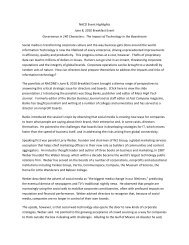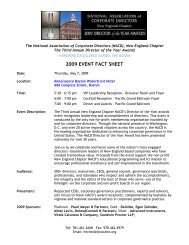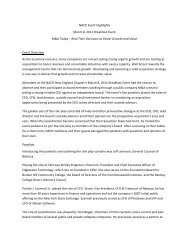IFRS: What should boards and audit committees be ... - IAS Plus
IFRS: What should boards and audit committees be ... - IAS Plus
IFRS: What should boards and audit committees be ... - IAS Plus
Create successful ePaper yourself
Turn your PDF publications into a flip-book with our unique Google optimized e-Paper software.
InventoryGeneral Requirements Potential Differences from U.S. GAAP••••••Primary st<strong>and</strong>ard – <strong>IAS</strong> 2Guidance addresses the recognition<strong>and</strong> measurement of inventoryAlternatives for measuring the cost of inventoryinclude FIFO <strong>and</strong> weighted average cost; “retailmethod” also is allowed if it approximates costThe same cost formula must <strong>be</strong> used for all inventoryhaving a similar nature <strong>and</strong> useThe subsequent measurement of inventory is basedon the lower of cost or “net realizable value”NRV is the estimated selling price of the inventoryin the ordinary course of business less the estimatedcosts of completion <strong>and</strong> of making the sale•••••Use of LIFO as a measurement basis for inventory isprohibited under <strong>IFRS</strong>Inventory is required to <strong>be</strong> measured at the lower ofcost or NRV, which may not <strong>be</strong> the same as a “marketvalue”Same cost formula must <strong>be</strong> used for inventory of asimilar natureCosts related to asset retirement obligations may <strong>be</strong>included as part of inventory cost basis, rather thanproperty, plant <strong>and</strong> equipment (PP&E)Impairment charges on inventory are required to <strong>be</strong>reversed, if certain criteria are metImplementation Considerations•••••Data capture may <strong>be</strong> more or less detailed leading to possible inventory system changesCost formulas for inventories whose nature <strong>and</strong> use are similar may need to <strong>be</strong> aligned throughout the entityNRV will need to <strong>be</strong> calculated <strong>and</strong> trackedProcesses <strong>and</strong> controls will need to <strong>be</strong> developed for monitoring whether inventory impairment <strong>should</strong> <strong>be</strong>subsequently reversedChanges in the measurement basis of inventory may affect income taxes, particularly if LIFO currently is used as ameasurement basis• Changes pending: NoneKey Questions to Ask••••Will the basis of inventory measurement change?<strong>What</strong> processes are in place to monitor the reversal of inventory impairment?Have tax implications <strong>be</strong>en assessed relating to potential changes in accounting for inventory?Has the cost formula <strong>be</strong>en adjusted to include capitalized inventory costs, such as those associated with assetretirement obligations?Consolidation PolicyGeneral Requirements Potential Differences from U.S. GAAP••••••••Primary st<strong>and</strong>ard – <strong>IAS</strong> 27Key issue is determining whether “control” existsAll controlled entities are required to <strong>be</strong>consolidated, with limited exceptions for certainnonpublic entitiesControl is the power to govern the financial <strong>and</strong>operating policies of an entity so as to obtain<strong>be</strong>nefit from its activitiesGuidance provides a num<strong>be</strong>r of control “indicators”that focus on governance <strong>and</strong> decision-makingactivities, as well as economic factors such as<strong>be</strong>nefits <strong>and</strong> risksPotential voting rights must <strong>be</strong> considered whenassessing whether control existsEntities holding less than majority of voting rightsmay still consolidate under “de facto” controlGuidance also included on the presentation of theparent’s separate financial statements••••Overall consolidation approach is based on whether anentity controls another; applies to all types of entitiesregardless of legal structureThere is no exception from consolidation for “investmentcompanies”The accounting policies of all subsidiaries must <strong>be</strong>conformed to those used in consolidationThe reporting dates of all subsidiaries must <strong>be</strong> conformedImplementation Considerations••••Determining whether entities <strong>should</strong> <strong>be</strong> consolidated will require increased judgmentProcesses <strong>and</strong> controls will need to <strong>be</strong> developed for monitoring potential voting rights <strong>and</strong> whether they arecurrently exercisable or convertibleProcesses for the capture of financial data related to all controlled entities will need to <strong>be</strong> developed, <strong>and</strong> accountingpolicies <strong>and</strong> reporting dates will need to <strong>be</strong> conformedChanges in the reporting entity as a result of more or fewer entities consolidated may affect income taxes• Changes pending: The <strong>IAS</strong>B is currently working on a new consolidation st<strong>and</strong>ard, as part of a joint project withthe FASB, which will revise the definition of control, include more application guidance, <strong>and</strong> require enhanceddisclosures. In addition, the FASB issued guidance (Statement 167) in June 2009 to improve the financial reportingfor variable interest entities.Key Questions to Ask••••Will more or fewer entities <strong>be</strong> consolidated, <strong>and</strong> how will that affect existing transactions <strong>be</strong>tween or among entitieswithin the consolidated group?<strong>What</strong> processes are in place for making judgments about consolidation policy?Do the reporting dates or accounting policies of any entities within the consolidated group differ?Are the current information systems capable of capturing the information needed to reflect changes in the reportingentity?<strong>IFRS</strong>: <strong>What</strong> <strong>should</strong> <strong>boards</strong> <strong>and</strong> <strong>audit</strong> <strong>committees</strong> <strong>be</strong> considering now? 11





